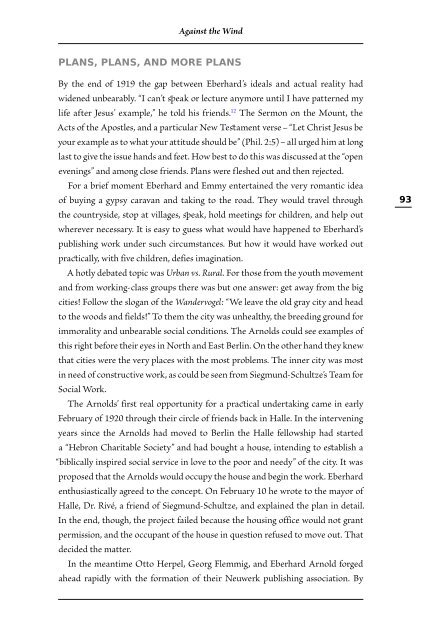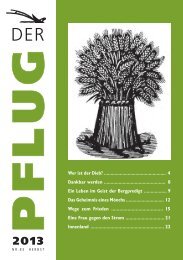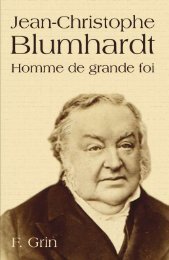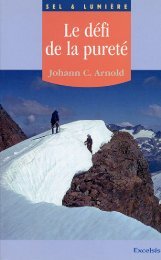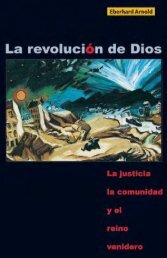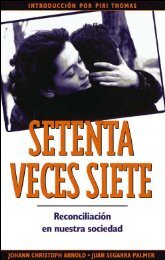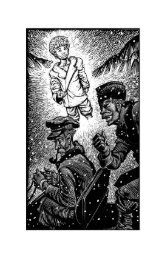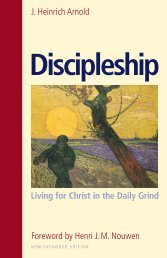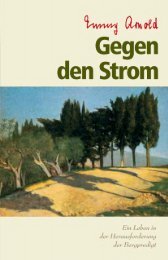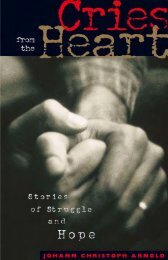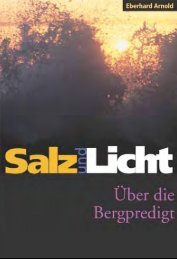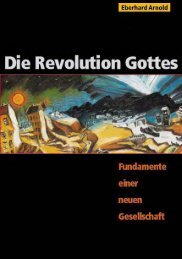Against the Wind: Eberhard Arnold and the Bruderhof - Plough
Against the Wind: Eberhard Arnold and the Bruderhof - Plough
Against the Wind: Eberhard Arnold and the Bruderhof - Plough
Create successful ePaper yourself
Turn your PDF publications into a flip-book with our unique Google optimized e-Paper software.
<strong>Against</strong> <strong>the</strong> <strong>Wind</strong><br />
planS, planS, <strong>and</strong> morE planS<br />
By <strong>the</strong> end of 1919 <strong>the</strong> gap between <strong>Eberhard</strong>’s ideals <strong>and</strong> actual reality had<br />
widened unbearably. “I can’t seak or lecture anymore until I have patterned my<br />
life after Jesus’ example,” he told his friends. 12 The Sermon on <strong>the</strong> Mount, <strong>the</strong><br />
Acts of <strong>the</strong> Apostles, <strong>and</strong> a particular New Tesament verse – “Let Christ Jesus be<br />
your example as to what your attitude should be” (Phil. 2:5) – all urged him at long<br />
last to give <strong>the</strong> issue h<strong>and</strong>s <strong>and</strong> feet. How best to do this was discussed at <strong>the</strong> “open<br />
evenings” <strong>and</strong> among close friends. Plans were fleshed out <strong>and</strong> <strong>the</strong>n rejected.<br />
For a brief moment <strong>Eberhard</strong> <strong>and</strong> Emmy entertained <strong>the</strong> very romantic idea<br />
of buying a gypsy caravan <strong>and</strong> taking to <strong>the</strong> road. They would travel through<br />
<strong>the</strong> countryside, stop at villages, seak, hold meetings for children, <strong>and</strong> help out<br />
wherever necessary. It is easy to guess what would have happened to <strong>Eberhard</strong>’s<br />
publishing work under such circumstances. But how it would have worked out<br />
pracically, with five children, defies imagination.<br />
A hotly debated topic was Urban vs. Rural. For those from <strong>the</strong> youth movement<br />
<strong>and</strong> from working-class groups <strong>the</strong>re was but one answer: get away from <strong>the</strong> big<br />
cities! Follow <strong>the</strong> slogan of <strong>the</strong> W<strong>and</strong>ervogel: “We leave <strong>the</strong> old gray city <strong>and</strong> head<br />
to <strong>the</strong> woods <strong>and</strong> fields!” To <strong>the</strong>m <strong>the</strong> city was unhealthy, <strong>the</strong> breeding ground for<br />
immorality <strong>and</strong> unbearable social conditions. The <strong>Arnold</strong>s could see examples of<br />
this right before <strong>the</strong>ir eyes in North <strong>and</strong> East Berlin. On <strong>the</strong> o<strong>the</strong>r h<strong>and</strong> <strong>the</strong>y knew<br />
that cities were <strong>the</strong> very places with <strong>the</strong> most problems. The inner city was most<br />
in need of constructive work, as could be seen from Siegmund-Schultze’s Team for<br />
Social Work.<br />
The <strong>Arnold</strong>s’ first real opportunity for a pracical undertaking came in early<br />
February of 1920 through <strong>the</strong>ir circle of friends back in Halle. In <strong>the</strong> intervening<br />
years since <strong>the</strong> <strong>Arnold</strong>s had moved to Berlin <strong>the</strong> Halle fellowship had started<br />
a “Hebron Charitable Society” <strong>and</strong> had bought a house, intending to esablish a<br />
“biblically inspired social service in love to <strong>the</strong> poor <strong>and</strong> needy” of <strong>the</strong> city. It was<br />
proposed that <strong>the</strong> <strong>Arnold</strong>s would occupy <strong>the</strong> house <strong>and</strong> begin <strong>the</strong> work. <strong>Eberhard</strong><br />
enthusiastically agreed to <strong>the</strong> concept. On February 10 he wrote to <strong>the</strong> mayor of<br />
Halle, Dr. Rivé, a friend of Siegmund-Schultze, <strong>and</strong> explained <strong>the</strong> plan in detail.<br />
In <strong>the</strong> end, though, <strong>the</strong> project failed because <strong>the</strong> housing office would not grant<br />
permission, <strong>and</strong> <strong>the</strong> occupant of <strong>the</strong> house in question refused to move out. That<br />
decided <strong>the</strong> matter.<br />
In <strong>the</strong> meantime Otto Herpel, Georg Flemmig, <strong>and</strong> <strong>Eberhard</strong> <strong>Arnold</strong> forged<br />
ahead rapidly with <strong>the</strong> formation of <strong>the</strong>ir Neuwerk publishing association. By<br />
93


